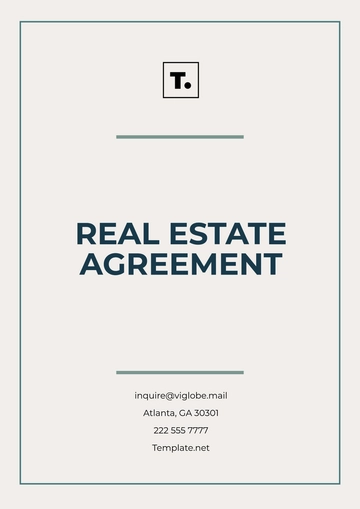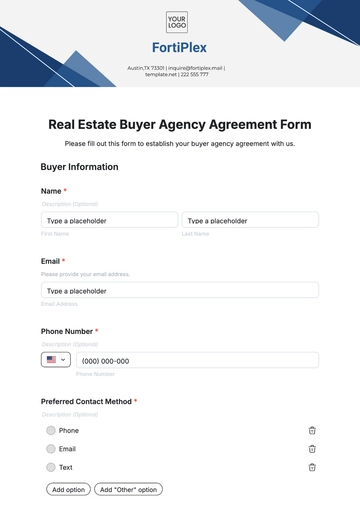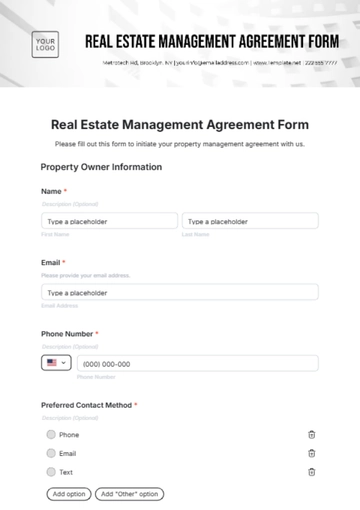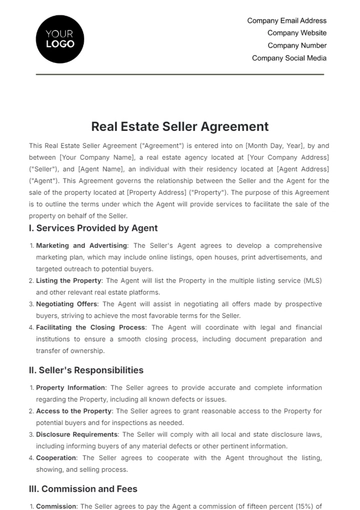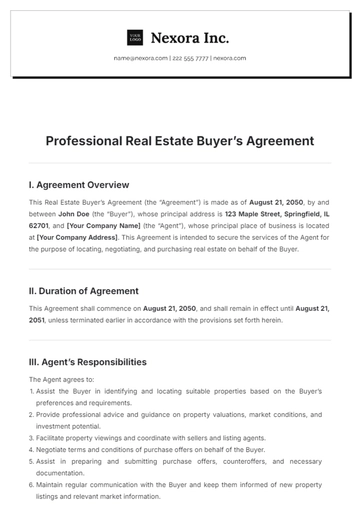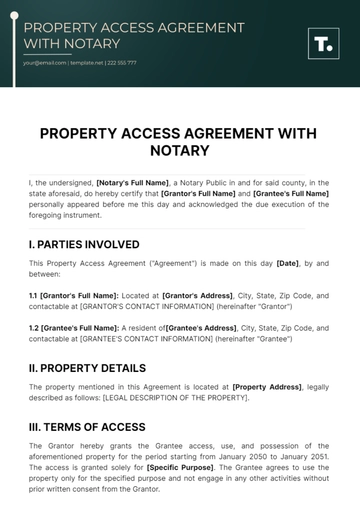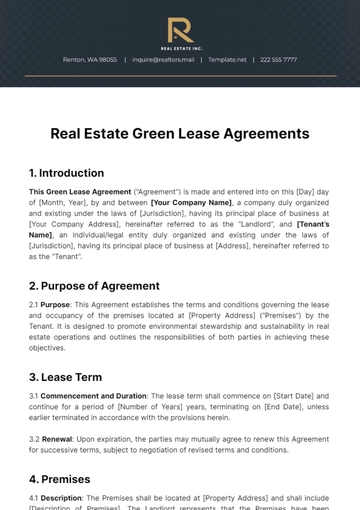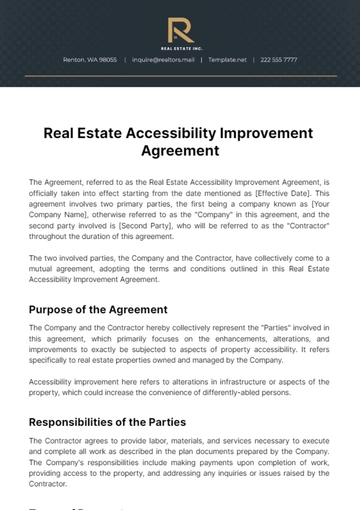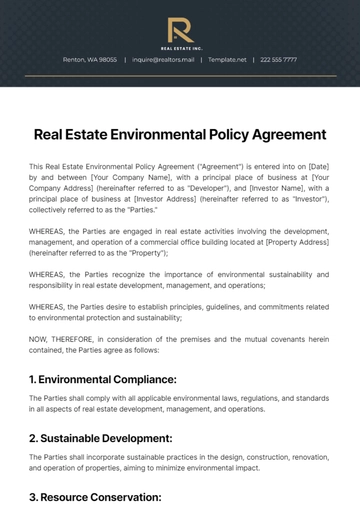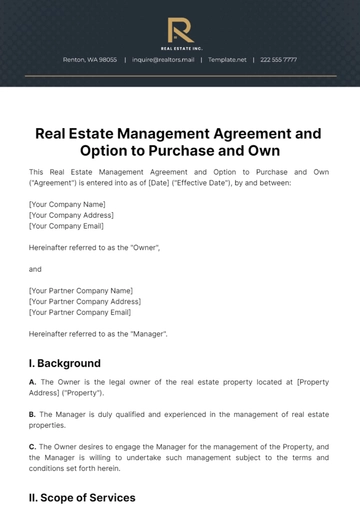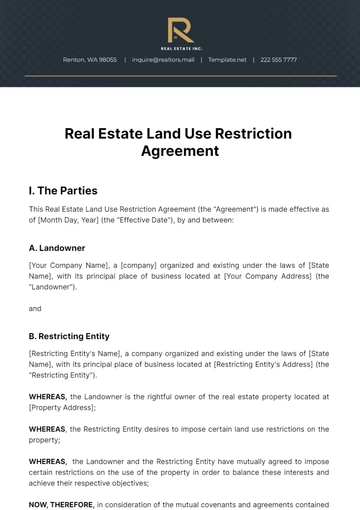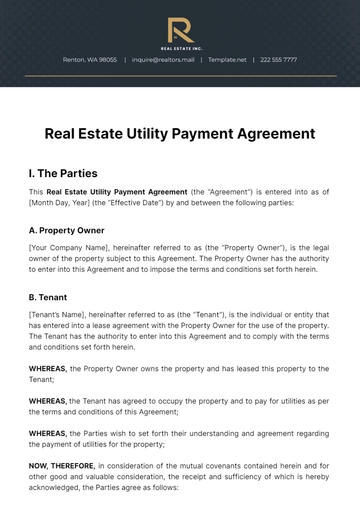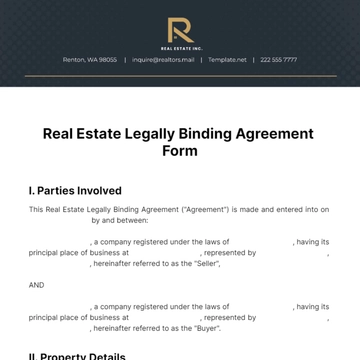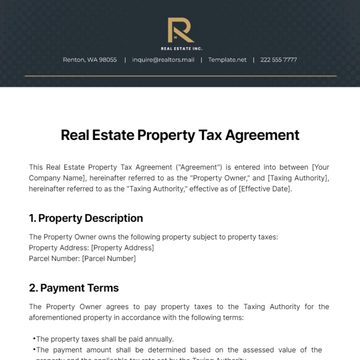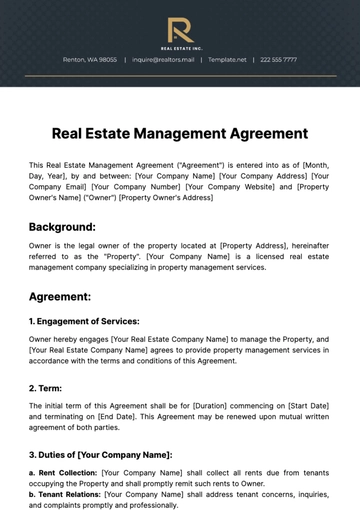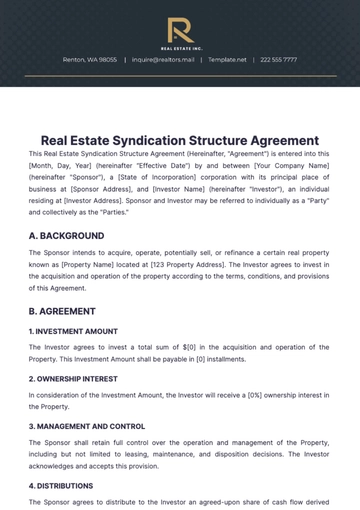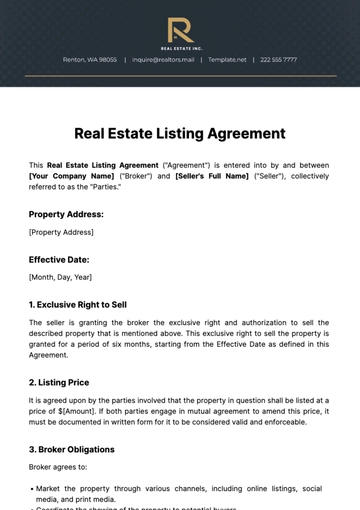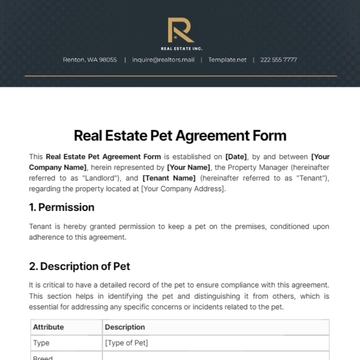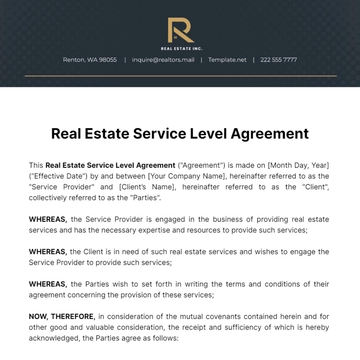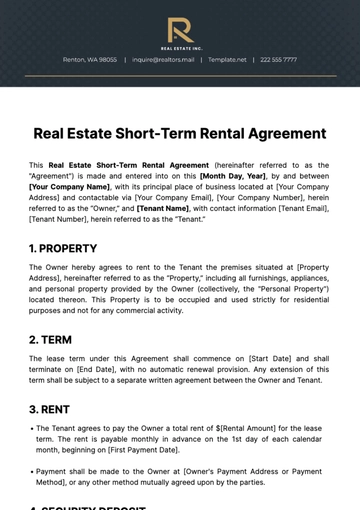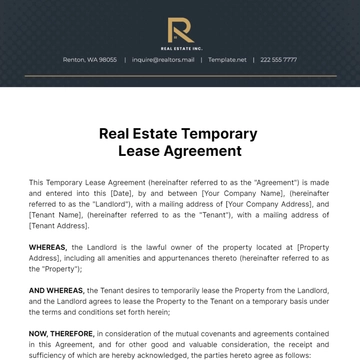Free Real Estate Land Use Restriction Agreement
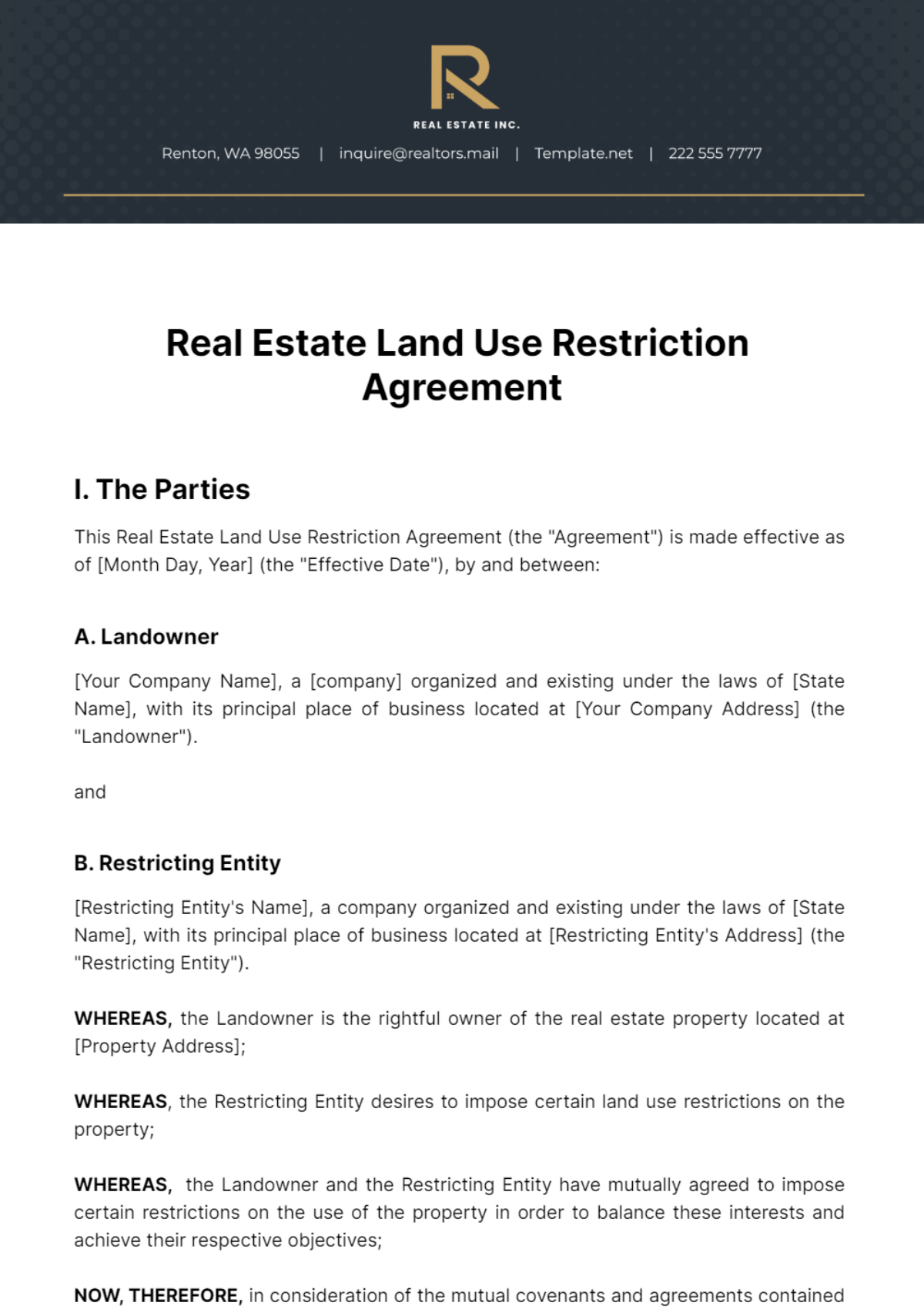
I. The Parties
This Real Estate Land Use Restriction Agreement (the "Agreement") is made effective as of [Month Day, Year] (the "Effective Date"), by and between:
A. Landowner
[Your Company Name], a [company] organized and existing under the laws of [State Name], with its principal place of business located at [Your Company Address] (the "Landowner").
and
B. Restricting Entity
[Restricting Entity's Name], a company organized and existing under the laws of [State Name], with its principal place of business located at [Restricting Entity's Address] (the "Restricting Entity").
WHEREAS, the Landowner is the rightful owner of the real estate property located at [Property Address];
WHEREAS, the Restricting Entity desires to impose certain land use restrictions on the property;
WHEREAS, the Landowner and the Restricting Entity have mutually agreed to impose certain restrictions on the use of the property in order to balance these interests and achieve their respective objectives;
NOW, THEREFORE, in consideration of the mutual covenants and agreements contained herein, the parties hereby agree as follows:
II. Land Use Restrictions
A. Prohibited Uses
Commercial Purposes: The Landowner agrees not to use the property for any commercial purposes, including but not limited to industrial, retail, or office use. This restriction is intended to preserve the character of the property and prevent activities that could potentially harm the environment or disrupt the surrounding community. It also helps to maintain the tranquility and residential nature of the property, ensuring it remains a peaceful and enjoyable place for residents.
Harmful Activities: The Landowner shall not engage in any activities that may harm the environment or neighboring properties. This includes activities that could lead to pollution, excessive noise, or other forms of environmental degradation. By refraining from such activities, the Landowner helps to protect the local ecosystem and maintain a healthy and safe environment for all residents.
Alterations: Any proposed changes to the land use restrictions must be agreed upon by both parties in writing before implementation. This ensures that any alterations to the property use are in line with the agreed-upon restrictions and maintain the integrity of the property. It also provides a clear process for making changes, ensuring that both parties have a say in any proposed alterations.
B. Maintenance and Inspection
Property Maintenance: The Landowner shall maintain the property in good condition, ensuring that it remains safe, clean, and in compliance with all relevant regulations and restrictions. Regular maintenance helps to preserve the value and attractiveness of the property, and ensures that it continues to meet the standards set out in the land use restrictions.
Inspection Rights: The Restricting Entity, shall have the right to inspect the property periodically to ensure compliance with the agreed-upon land use restrictions. Regular inspections allow the Restricting Entity to monitor the condition of the property and ensure that the Landowner is adhering to the agreed-upon restrictions.
Breach Resolution: In the event of a breach of the land use restrictions, the parties shall seek to resolve the issue amicably through mediation before pursuing legal action. This approach promotes a cooperative and constructive resolution process, and helps to maintain a positive and productive relationship between the parties.
III. Term of Agreement
A. Initial Term
Commencement: The Agreement will commence on the effective date and will continue for an initial term of [3] years. This provides a clear timeline for the implementation and enforcement of the land use restrictions, and gives both parties certainty about the duration of the Agreement.
Compliance: During the initial term, the Landowner is expected to comply with all the terms and conditions of the Agreement, including the land use restrictions. This ensures that the property is used in a manner that aligns with the agreed-upon restrictions throughout the duration of the Agreement.
Review: Towards the end of the initial term, the parties will review the Agreement and assess the effectiveness of the land use restrictions. This review process allows the parties to reflect on their experiences, learn from any challenges or successes, and make any necessary adjustments to the Agreement.
B. Renewal
Mutual Agreement: Upon expiration of the initial term, the Agreement may be renewed for additional terms by mutual agreement of the parties. This allows for the continuation of the land use restrictions, subject to any necessary adjustments or updates. It also provides an opportunity for the parties to reaffirm their commitment to the Agreement and the principles it represents.
Review and Negotiation: The terms of renewal will be subject to review and negotiation by both parties, ensuring that the Agreement remains relevant and effective. This process allows the parties to take into account any changes in circumstances, new information or insights, and evolving goals or priorities.
Continued Compliance: If the Agreement is renewed, the Landowner will be expected to continue complying with the land use restrictions for the duration of the renewed term. This ensures that the property continues to be used in a manner that aligns with the agreed-upon restrictions, regardless of any changes in ownership or other circumstances.
IV. Compliance with Laws
A. Understanding and Adherence
Knowledge of Laws: Both parties commit to having a thorough understanding of all laws, regulations, and ordinances applicable to the property.
1.1. This includes local zoning laws, environmental regulations, and any other laws related to land use and property development.
1.2. Both parties will regularly review these laws to ensure their knowledge is up-to-date and accurate.
1.3. Any changes or updates to these laws will be communicated between the parties in a timely manner.
Continuous Compliance: Both parties agree to continuously comply with these laws throughout the term of the Agreement.
2.1. This means that even if laws change, both parties will adapt and ensure continued compliance.
2.2. Regular audits or checks may be conducted to ensure ongoing compliance with these laws.
2.3. Any issues or potential breaches of these laws will be addressed promptly and effectively.
Legal Updates: Both parties will stay informed about any changes or updates to relevant laws.
3.1. This proactive approach ensures that both parties can promptly adapt to any changes and maintain compliance.
3.2. Both parties will dedicate resources to monitor these legal updates regularly.
3.3. Any significant changes that could impact the Agreement or the use of the property will be discussed and addressed by both parties.
B. Legal Consequences
Breach of Laws: If either party breaches any applicable laws, they will be responsible for any legal consequences, including fines, penalties, or other sanctions.
1.1. This includes any legal consequences imposed by regulatory bodies or courts.
1.2. The breaching party will be responsible for addressing these consequences, including paying any fines or penalties.
1.3. The non-breaching party may also seek compensation or other remedies from the breaching party as per the terms of the Agreement.
Legal Remedies: In the event of a breach of laws, the non-breaching party has the right to seek legal remedies to enforce compliance.
2.1. This could include taking legal action against the breaching party.
2.2. The non-breaching party will also cooperate with any investigations or proceedings initiated by regulatory bodies or courts.
2.3. Any legal remedies will be pursued in accordance with the dispute resolution provisions of the Agreement.
Legal Assistance: Both parties agree to cooperate fully in any legal proceedings related to the Agreement, including providing any necessary documents or information.
3.1. This could include providing evidence, giving testimony, or assisting in investigations.
3.2. Both parties will ensure that their employees, agents, or representatives also cooperate in these proceedings.
3.3. This cooperation is essential to ensure a fair and effective resolution of any legal issues.
V. Termination
This Agreement may be terminated by mutual agreement of the parties or in the event of a material breach by either party. The termination process is a critical aspect of the Agreement and is as follows:
A. Mutual Agreement
Termination Process: If both parties agree to terminate the Agreement, they will follow a mutually agreed-upon termination process. This process will be outlined in writing and signed by both parties.
Settlement of Obligations: Upon termination, both parties agree to settle any outstanding obligations related to the Agreement. This could include financial obligations, property adjustments, or any other responsibilities outlined in the Agreement.
Notification: Both parties agree to provide appropriate notification to any relevant parties, such as local authorities or stakeholders, about the termination of the Agreement.
B. Material Breach
Breach Identification: If either party commits a material breach of the Agreement, the non-breaching party will identify the breach and notify the breaching party in writing.
Remediation Opportunity: The breaching party will be given an opportunity to remedy the breach within a specified timeframe. If the breach is not remedied within this timeframe, the non-breaching party may proceed with termination.
Termination Process: In the event of termination due to a material breach, the parties shall follow the procedures outlined in this Agreement. This includes settling any outstanding obligations and notifying any relevant parties.
VI. Governing Law
A. Jurisdiction
Applicable Laws: The laws of [State Name] will be the guiding principles for interpreting the terms and conditions of this Agreement. This includes any state-specific laws related to real estate, land use, and environmental conservation.
Legal Disputes: In the event of any legal disputes arising from this Agreement, they will be resolved under the jurisdiction of [State Name]. This ensures that any legal proceedings will be conducted in a familiar legal environment for both parties.
B. Legal Interpretation
The interpretation of the Agreement and its terms will be done as per the laws of [State Name]. This ensures consistency and fairness in the interpretation of the Agreement.
VII. Entire Agreement
A. Superseding Effect
Prior Agreements: This Agreement supersedes any and all prior agreements between the Landowner and the Restricting Entity regarding the property. This ensures that there are no conflicting terms or conditions from previous agreements.
Oral Agreements: This Agreement also supersedes any oral agreements or understandings that might have existed between the parties. This ensures that all terms and conditions are documented and legally enforceable.
Negotiations and Discussions: Any negotiations or discussions that took place prior to this Agreement are superseded by the terms and conditions of this Agreement. This provides clarity and certainty about the agreed-upon terms.
B. Completeness
Entire Agreement: This Agreement represents the entire understanding between the Landowner and the Restricting Entity regarding the land use restrictions for the property. This ensures that all relevant information is contained within a single document.
Inclusion of Terms: All terms, conditions, and provisions related to the land use restrictions have been included in this Agreement. This ensures that both parties have a clear understanding of their rights and responsibilities.
Future Amendments: Any future amendments to this Agreement must be made in writing and signed by both parties. This ensures that any changes to the Agreement are properly documented and agreed upon by both parties.
VIII. Severability
A. Preservation of the Agreement
Invalid Provisions: If a court or other legal authority determines that a provision of the Agreement is invalid or unenforceable, that provision will be severed from the Agreement.
Remaining Provisions: The remaining provisions of the Agreement will continue to be valid and enforceable. This ensures that the rest of the Agreement remains intact and in effect.
Continued Compliance: Both parties agree to continue complying with the remaining provisions of the Agreement, even if one or more provisions are severed.
B. Legal Implications
Legal Disputes: The severability clause helps to prevent legal disputes from invalidating the entire Agreement. This provides stability and predictability for both parties.
Legal Remedies: If a provision is severed, the parties may seek to amend the Agreement to replace the severed provision with a valid and enforceable one.
Legal Interpretation: The severability clause is a standard provision in legal agreements and is interpreted in accordance with the laws of [State Name].
IX. Signature
IN WITNESS WHEREOF, the parties hereto have executed this Agreement as of the Effective Date.
Landowner

[Authorized Representative Name]
[Your Company Name]
Date: [Month Day, Year]
Restricting Entity

[Restricting Entity's Name]
Date: [Month Day, Year]
- 100% Customizable, free editor
- Access 1 Million+ Templates, photo’s & graphics
- Download or share as a template
- Click and replace photos, graphics, text, backgrounds
- Resize, crop, AI write & more
- Access advanced editor
Defining land use restrictions in real estate deals is made easier with the Real Estate Land Use Restriction Agreement Template from Template.net! This editable agreement template is customizable with the AI Editor Tool, allowing it to be tailored to specific needs, ensuring clear and precise land use agreements. Edit now!
You may also like
- Lease Agreement
- Non Compete Agreement
- Rental Agreement
- Prenuptial Agreement
- Non Disclosure Agreement
- Operating Agreement
- Hold Harmless Agreement
- LLC Operating Agreement
- Arbitration Agreement
- Purchase Agreement
- Residential Lease Agreement
- Executive Agreement
- Confidentiality Agreement
- Contractor Agreement
- Partnership Agreement
- Postnuptial Agreement
- Collective Bargaining Agreement
- Loan Agreement
- Roommate Agreement
- Commercial Lease Agreement
- Separation Agreement
- Cohabitation Agreement
- Room Rental Agreement
- Child Custody Agreement
- Employee Agreement
- License Agreements
- Settlement Agreement
- Joint Venture Agreement
- Indemnity Agreement
- Subordination Agreement
- Sales Agreement
- Agreements Between Two Parties
- Business Agreement
- Real Estate Agreement
- HR Agreement
- Service Agreement
- Property Agreement
- Agreement Letter
- Restaurant Agreement
- Construction Agreement
- Finance Agreement
- Marketing Agreement
- Payment Agreement
- Investment Agreement
- Management Agreement
- Nonprofit Agreement
- Software Agreement
- Startup Agreement
- Agency Agreement
- Copyright Agreement
- Collaboration Agreement
- Reseller Agreement
- Car Rental Agreement
- Cleaning Services Agreement
- Consultant Agreement
- Deed Agreement
- Car Agreement
- Equipment Agreement
- Shares Agreement
- Data Sharing Agreement
- Advertising Agreement
- School Agreement
- Franchise Agreement
- Event Agreement
- Travel Agency Agreement
- Vehicle Agreement
- Board Resolution Agreement
- Land Agreement
- Binding Agreement
- Tenancy Agreement
- Exclusive Agreement
- Development Agreement
- Assignment Agreement
- Design Agreement
- Equity Agreement
- Mortgage Agreement
- Purchase and Sale Agreement
- Shareholder Agreement
- Vendor Agreement
- Royalty Agreement
- Vehicle Lease Agreement
- Hotel Agreement
- Tenant Agreement
- Artist Agreement
- Commission Agreement
- Consignment Agreement
- Debt Agreement
- Recruitment Agreement
- Training Agreement
- Transfer Agreement
- Apprenticeship Agreement
- IT and Software Agreement
- Referral Agreement
- Resolution Agreement
- Waiver Agreement
- Consent Agreement
- Partner Agreement
- Social Media Agreement
- Customer Agreement
- Credit Agreement
- Supply Agreement
- Agent Agreement
- Brand Agreement
- Law Firm Agreement
- Maintenance Agreement
- Mutual Agreement
- Retail Agreement
- Deposit Agreement
- Land Purchase Agreement
- Nursing Home Agreement
- Supplier Agreement
- Buy Sell Agreement
- Child Support Agreement
- Landlord Agreement
- Payment Plan Agreement
- Release Agreement
- Research Agreement
- Sponsorship Agreement
- Buyout Agreement
- Equipment Rental Agreement
- Farm Agreement
- Manufacturing Agreement
- Strategic Agreement
- Termination of Lease Agreement
- Compliance Agreement
- Family Agreement
- Interior Design Agreement
- Ownership Agreement
- Residential Lease Agreement
- Retainer Agreement
- Trade Agreement
- University Agreement
- Broker Agreement
- Dissolution Agreement
- Funding Agreement
- Hosting Agreement
- Investor Agreement
- Memorandum of Agreement
- Advisory Agreement
- Affiliate Agreement
- Freelancer Agreement
- Grant Agreement
- Master Service Agreement
- Parking Agreement
- Subscription Agreement
- Trust Agreement
- Cancellation Agreement
- Horse Agreement
- Influencer Agreement
- Membership Agreement
- Vacation Rental Agreement
- Wholesale Agreement
- Author Agreement
- Distributor Agreement
- Exchange Agreement
- Food Agreement
- Guarantee Agreement
- Installment Agreement
- Internship Agreement
- Music Agreement
- Severance Agreement
- Software Development Agreement
- Storage Agreement
- Facility Agreement
- Intercompany Agreement
- Lending Agreement
- Lodger Agreement
- Outsourcing Services Agreement
- Usage Agreement
- Assurance Agreement
- Photography Agreement
- Profit Sharing Agreement
- Relationship Agreement
- Rent To Own Agreement
- Repayment Agreement
- Volunteer Agreement
- Co Parenting Agreement
- HVAC Agreement
- Lawn Care Agreement
- SAAS Agreement
- Work from Home Agreement
- Coaching Agreement
- Protection Agreement
- Security Agreement
- Repair Agreement
- Agreements License


